SDG Blog

Amid crisis there is reason to hope – if we come together to pursue social justice
By Gilbert F. Houngbo, Director-General, International Labour Organization
Coming out of the recent World Economic Forum at Davos, I reflected on what the current state of affairs means for the world of work and the Sustainable Development Goals.
The WEF rightly observed that we are at an inflection point. The world is facing several overlapping global crises – conflict, a global economic downturn, and the devastating effects of climate change among others. We had hopes, coming out of the COVID-19 pandemic, that we could build forward better, that we could focus on climate change action and on rescuing the Sustainable Development Goals, as called for by the UN Secretary-General. But these hopes have been upended by a fresh crisis in food and energy, caused by the outbreak of the war in Ukraine.
In the world of work, our recent report: World Employment and Social Outlook: Trends 2023 also paints a troubling picture. Global employment growth will be only 1.0 per cent in 2023, less than half the level of 2022. Global unemployment is slated to rise slightly in 2023, by around 3 million, to 208 million. This would mark a reversal of the decline in global unemployment seen between 2020-2022. The current slowdown means that many workers will have to accept lower quality jobs, often at very low pay, sometimes with insufficient hours. Furthermore, as prices rise faster than nominal labour incomes, the cost-of-living crisis risks pushing more people into poverty, including millions who are being pushed below the poverty line. This trend comes on top of significant declines in income seen during the COVID-19 crisis, which affected low-income groups worst in many countries. As a result, we see a rise in inequality in many parts of the globe, raising the spectre of increasing social tensions.
Many businesses are also struggling with the impact of these multiple crises, with small and micro-enterprises being particularly vulnerable.
Cooperation
Yet, thinking back to the discussion in Davos, where the focus was on cooperation, I also came away with the impression and conviction that there is hope: there is a willingness and determination in the international world to work together. There is also an emerging understanding that we must collaborate to address economic, social and environmental concerns on an equal basis. In this endeavour, the 2030 Agenda must remain our guiding framework for multilateral action.
SDG 8 on Decent Work and Sustainable Economic Growth sits at the heart of the 17 SDGs – and rightly so. Labour standards, employment policies, social protection and social dialogue are more important than ever. Indeed, decent work is central to all of our lives and goes far beyond the workplace. It is the pathway out of poverty and a core element of sustainable development. This is why aspects of the ILO’s decent work agenda are also included in many other SDGs: from poverty reduction, food security, health, and inequality, to the range of environmental goals which need just transitions, and the quest for peace, justice and strong institutions.
We therefore have the elements in place to accelerate the action needed on the social dimension of sustainable development. The world of work, centred around SDG 8 and related goals, is a good entry point in this regard. Combined actions, global and national, are crucial in countries which confront massive decent work deficits and excessive inequalities while their financial resources and institutional capacities are limited.
Social justice
When we think of social justice, we think of fairness, of equality, of having the means – and the right – to a dignified life. Decent work is key to social justice, opening up a world of possibilities on food, health, education and a safe and clean environment.
However, social justice is more than an aspiration. It is doable. We learned from the COVID-19 pandemic that it is possible for countries to work together.
That is why I have hope that together, we can work towards social justice in a broad coalition, enabling societies and economies to function better and to reduce poverty, inequalities and social tensions, and put in motion a just transition to greener, sustainable, and fairer economies.
We should heed the call from Davos and cooperate in this fragmented world to move ahead on the path towards sustainable development via the SDGs. This year the International Labour Organization will be bringing together a Global Coalition for Social Justice. Achieving SDG 8 on decent work will help turn aspiration for an equal, just world into a reality.
* The views expressed in this blog are the author’s and do not necessarily reflect the opinion of UN DESA.
 Welcome to the United Nations
Welcome to the United Nations